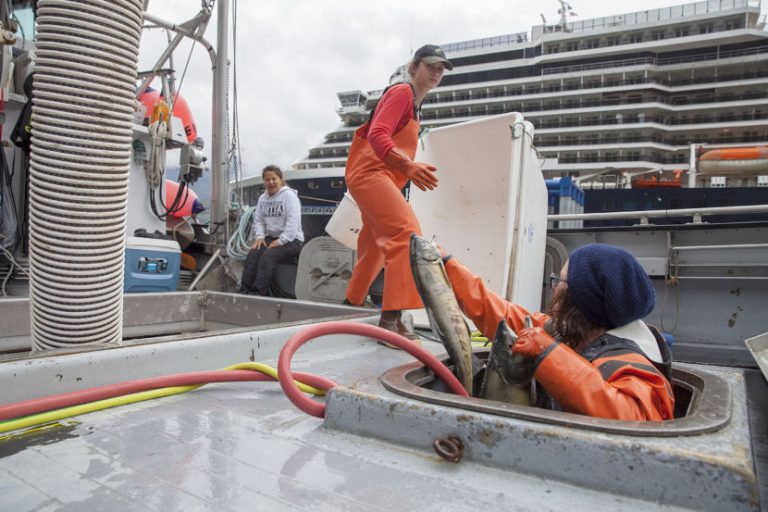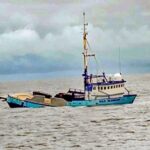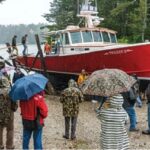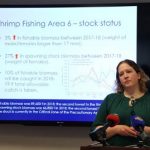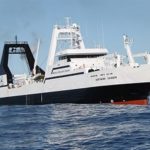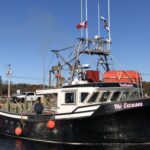Category Archives: National
Athearn Marine Agency Boat of the Week: 38′ Calvin Beal Lobster/Tuna Boat, 700HP Volvo D13 Diesel
 To review specifications, information, with 20 photos, >click here<. To see all the boats in this series >click here<. 06:08
To review specifications, information, with 20 photos, >click here<. To see all the boats in this series >click here<. 06:08
Save LBI Petitions Federal Agencies to Create a Safe Migration Corridor from Georgia to Maine to Save the North Atlantic Right Whale from Extinction
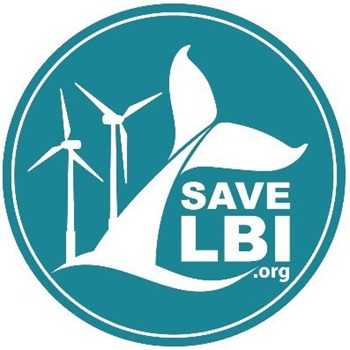 Save LBI, the non-partisan organization dedicated to protecting our oceans from the destructive impacts of offshore wind projects, has filed a petition urging the U.S. Department of Commerce (DOC)/National Marine Fisheries Service (NMFS) and Department of the Interior (DOI)/Bureau of Ocean Energy Management (BOEM) to create a safe migration corridor from Maine to Georgia that will allow the critically endangered North Atlantic right whale (NARW) to survive as a species. With a population that has dwindled to 340, the magnificent right whale is perilously close to extinction and faces a new, greater and ominous threat from numerous proposed offshore wind-turbine complexes up and down the East Coast. more, >>CLICK TO READ<< 10:55
Save LBI, the non-partisan organization dedicated to protecting our oceans from the destructive impacts of offshore wind projects, has filed a petition urging the U.S. Department of Commerce (DOC)/National Marine Fisheries Service (NMFS) and Department of the Interior (DOI)/Bureau of Ocean Energy Management (BOEM) to create a safe migration corridor from Maine to Georgia that will allow the critically endangered North Atlantic right whale (NARW) to survive as a species. With a population that has dwindled to 340, the magnificent right whale is perilously close to extinction and faces a new, greater and ominous threat from numerous proposed offshore wind-turbine complexes up and down the East Coast. more, >>CLICK TO READ<< 10:55
Developer halts negotiations for Gulf of Maine floating wind farm. Here’s why.
 Three years after they began, negotiations over a proposed power contract for an offshore floating wind farm in the Gulf of Maine have come to an abrupt halt, with the developer citing “recent shifts in the energy landscape that have in particular caused uncertainty in the offshore wind industry.” In a March 28 filing at the Public Utilities Commission, the PUC staff explained that Pine Tree Offshore Wind LLC has requested that the talks be temporarily suspended. When asked specifically why it was putting talks on hold, Pine Tree Offshore Wind declined to comment and referred questions to the GEO. more, >>CLICK TO READ<< 06:28
Three years after they began, negotiations over a proposed power contract for an offshore floating wind farm in the Gulf of Maine have come to an abrupt halt, with the developer citing “recent shifts in the energy landscape that have in particular caused uncertainty in the offshore wind industry.” In a March 28 filing at the Public Utilities Commission, the PUC staff explained that Pine Tree Offshore Wind LLC has requested that the talks be temporarily suspended. When asked specifically why it was putting talks on hold, Pine Tree Offshore Wind declined to comment and referred questions to the GEO. more, >>CLICK TO READ<< 06:28
Amid protests, quota cuts, and tariff threats, panel set to rule on snow crab prices
 Amid quota cuts, protests, a court challenge and the constant uncertainty of a mercurial U.S. president, parties for both sides of the lucrative Newfoundland and Labrador snow crab fishery have submitted their price recommendations. Now, they wait. In a social media post on Sunday, the Fish Food and Allied Workers union said the price setting panel hearing on snow crab began that morning. The union is asking the panel for a starting price of $4.97 per pound this season. In the same post, the union said the Association of Seafood Producers is asking the panel for a starting price of $4.50 per pound. “Everyone hears about $5, $6, even $7 crab, so nobody is terribly thrilled at the idea of $4.97, and even less thrilled at the idea of $4.50,” said Ray Critch, a negotiator and policy manager for the FFAW. Video, more, >>CLICK TO READ<< 15:04
Amid quota cuts, protests, a court challenge and the constant uncertainty of a mercurial U.S. president, parties for both sides of the lucrative Newfoundland and Labrador snow crab fishery have submitted their price recommendations. Now, they wait. In a social media post on Sunday, the Fish Food and Allied Workers union said the price setting panel hearing on snow crab began that morning. The union is asking the panel for a starting price of $4.97 per pound this season. In the same post, the union said the Association of Seafood Producers is asking the panel for a starting price of $4.50 per pound. “Everyone hears about $5, $6, even $7 crab, so nobody is terribly thrilled at the idea of $4.97, and even less thrilled at the idea of $4.50,” said Ray Critch, a negotiator and policy manager for the FFAW. Video, more, >>CLICK TO READ<< 15:04
Louisiana shrimpers commend new tariffs, express optimism
 Local shrimpers are hopeful the new tariffs on imported shrimp will bolster the domestic shrimp industry. “We’ve had to get more active and have to go to Baton Rouge or have to go to Washington, D.C. That kind of thing or something that really never happened from our level before,” said Cheri Blanchard with the Southern Shrimp Alliance. Blanchard has witnessed a shift in the local shrimping business over the years. She explains that more than 90% of shrimp consumed in the United States is imported from countries like India, Indonesia and Ecuador, driving down prices and crushing U.S. shrimp owners’ businesses. Video, more, >>CLICK TO READ<< 06:36
Local shrimpers are hopeful the new tariffs on imported shrimp will bolster the domestic shrimp industry. “We’ve had to get more active and have to go to Baton Rouge or have to go to Washington, D.C. That kind of thing or something that really never happened from our level before,” said Cheri Blanchard with the Southern Shrimp Alliance. Blanchard has witnessed a shift in the local shrimping business over the years. She explains that more than 90% of shrimp consumed in the United States is imported from countries like India, Indonesia and Ecuador, driving down prices and crushing U.S. shrimp owners’ businesses. Video, more, >>CLICK TO READ<< 06:36
Economic State Making it Tough for the Fishery, Says Producer
 A local value-added seafood producer says the current economic climate under U.S. tariffs has proved very challenging for his business. Danny Dumaresque of Labrador Gem Seafoods says half of his product has traditionally gone to the U.S. market, but “there’s no way to overcome a 25 per cent tariff.” While the province’s seafood industry has managed to avoid the tariff, for now, continued threats and the uncertainty that it created has forced many producers to look elsewhere. Dumaresque is now working on securing greater access to buyers in Spain, Italy, France and the U.K. Meanwhile, provincial fisheries minister Gerry Byrne has launched a Seafood Marketing Support Program to help local companies expand into global markets. more, >>CLICK TO READ<< 11:40
A local value-added seafood producer says the current economic climate under U.S. tariffs has proved very challenging for his business. Danny Dumaresque of Labrador Gem Seafoods says half of his product has traditionally gone to the U.S. market, but “there’s no way to overcome a 25 per cent tariff.” While the province’s seafood industry has managed to avoid the tariff, for now, continued threats and the uncertainty that it created has forced many producers to look elsewhere. Dumaresque is now working on securing greater access to buyers in Spain, Italy, France and the U.K. Meanwhile, provincial fisheries minister Gerry Byrne has launched a Seafood Marketing Support Program to help local companies expand into global markets. more, >>CLICK TO READ<< 11:40

South Carolina shrimper says Trump’s tariffs will provide ‘immediate relief’ to US fishery
CJ Seafood owner Craig Reaves told “America Reports” that so much of the industry is being outsourced to Southeast Asia, Ecuador, India and South America, while the U.S. fishery has been “crushed.” “I’m a lifelong shrimper. My dad was a shrimper, so we’re generational fishermen, and we’ve been getting killed by imports for not just years, but literally decades,” Reaves said. “So, we’ve been suffering for a long, long time, and these tariffs, we believe, are going to give us some immediate relief. Also, it’s bringing attention to our industry, who is dying. We’ve outsourced our whole industry. Ninety-four percent of the shrimp consumed in the United States is imported.” Video, more, >>CLICK TO READ<< 07:52
Judge blocks Chilean sea bass imports from Antarctica in fishing feud
 A federal judge in Florida has blocked the imports of a high-priced fish from protected waters near Antarctica, siding with U.S. regulators who argued they were required to block imports amid a diplomatic feud triggered by Russia’s obstruction of longstanding conservation efforts at the bottom of the world. Judge David Leibowitz, in a ruling Monday, dismissed a lawsuit filed in 2022 by Texas-based Southern Cross Seafoods that alleged it had suffered undue economic harm by what it argued was the U.S. government’s arbitrary decision to bar imports of Chilean sea bass. The case, closely watched by conservation groups and the fishing industry, stems from Russia’s rejection of catch limits for marine life near the South Pole. more, >>CLICK TO READ<< 06:43
A federal judge in Florida has blocked the imports of a high-priced fish from protected waters near Antarctica, siding with U.S. regulators who argued they were required to block imports amid a diplomatic feud triggered by Russia’s obstruction of longstanding conservation efforts at the bottom of the world. Judge David Leibowitz, in a ruling Monday, dismissed a lawsuit filed in 2022 by Texas-based Southern Cross Seafoods that alleged it had suffered undue economic harm by what it argued was the U.S. government’s arbitrary decision to bar imports of Chilean sea bass. The case, closely watched by conservation groups and the fishing industry, stems from Russia’s rejection of catch limits for marine life near the South Pole. more, >>CLICK TO READ<< 06:43
As other industries bristle, Louisiana shrimpers voice support for tariffs
 Louisiana shrimpers have spent years trying to keep their industry afloat amid a flood of cheap imported shrimp. They think the sweeping new tariffs announced this week could help, though they are still pushing for a more permanent solution. “If you break down you can’t even afford to put your boat back out, that’s how serious it is,” said Acy Cooper, President of the Louisiana Shrimp Association. In his decades as a commercial shrimper, he has seen the price of local shrimp plummet. “Last year, we had more closures and lower prices than we’ve ever had before,” he said. While leaders of other industries worry about the impact of the tariffs announced by President Trump this week, he expects them to help shrimpers like him compete in U.S. markets. Video, more, >>CLICK TO READ<< 08:03
Louisiana shrimpers have spent years trying to keep their industry afloat amid a flood of cheap imported shrimp. They think the sweeping new tariffs announced this week could help, though they are still pushing for a more permanent solution. “If you break down you can’t even afford to put your boat back out, that’s how serious it is,” said Acy Cooper, President of the Louisiana Shrimp Association. In his decades as a commercial shrimper, he has seen the price of local shrimp plummet. “Last year, we had more closures and lower prices than we’ve ever had before,” he said. While leaders of other industries worry about the impact of the tariffs announced by President Trump this week, he expects them to help shrimpers like him compete in U.S. markets. Video, more, >>CLICK TO READ<< 08:03
Sonoma County crabbers face new limits as state restricts season for 7th year — but can keep working
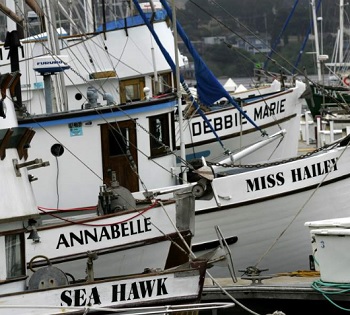 For the seventh year in a row, California officials are limiting commercial Dungeness crab fishing along the coast — including off Sonoma County — to protect humpback whales from becoming entangled in fishing gear. Dick Ogg, a commercial fisherman who represents Bodega Bay in the Dungeness Crab Gear Working Group, said the decision was difficult but reflects a fair compromise between conservation and livelihoods. “It is an awkward situation, but every chance that we can get to help guys be able to continue to fish a little bit safely, we’re gonna take it,” he said. “We have made good logical decisions based on data.” Ogg said most crabbers are relieved to be able to keep working — even in a limited capacity. more, >>CLICK TO READ<< 14:49
For the seventh year in a row, California officials are limiting commercial Dungeness crab fishing along the coast — including off Sonoma County — to protect humpback whales from becoming entangled in fishing gear. Dick Ogg, a commercial fisherman who represents Bodega Bay in the Dungeness Crab Gear Working Group, said the decision was difficult but reflects a fair compromise between conservation and livelihoods. “It is an awkward situation, but every chance that we can get to help guys be able to continue to fish a little bit safely, we’re gonna take it,” he said. “We have made good logical decisions based on data.” Ogg said most crabbers are relieved to be able to keep working — even in a limited capacity. more, >>CLICK TO READ<< 14:49

Alabama’s ‘demolished’ seafood industry could be saved by Trump’s ‘Liberation Day’ tariffs
President Donald Trump rolled out his tariff regime on Wednesday, also known as “Liberation Day,” by raising tariffs, including 34% more on imports from China, 46% on Vietnam and 32% on Taiwan. While the world reacted, people in Alabama’s coastal community are hopeful the move could save a dying industry. Billy Parks, the owner of Billy’s Seafood in Bon Secour, said his business has struggled for nearly two decades. “We’ve had a lot of influx of the imported, farm-raised Asian shrimp coming in and has pretty much demolished the shrimp seafood market as far as the local shrimp sales,” Parks explained. “So, when the fuel price started spiking real high, the shrimp prices started going way down, then it just put a lot of boats out of business.” Photos, more, >>CLICK TO READ<< 07:41
Carl Wilson gets committee nod to lead Maine Department of Marine Resources
 A legislative panel on Thursday voted unanimously to advance the nomination of Carl Wilson to lead the Maine Department of Marine Resources. Fishermen and the aquaculture industry told lawmakers that Wilson’s long tenure with the department and experience as a scientist make him a good fit to lead DMR. He joined the department in 1999 as lead lobster biologist and since 2015 has led the Bureau of Marine Science. “We need somebody who can hit the ground running,” said Patrice McCarron of the Maine Lobstermen’s Association. “He is well prepared to lead on day one.” He said the industry may not always agree with him, but that he’s willing to listen and wants to work more closely with them. “As a scientist, I was always the one throwing a hand grenade into the room and now I’m the one who has to jump on it,” Wilson said. more, >>CLICK TO READ<< 06:20
A legislative panel on Thursday voted unanimously to advance the nomination of Carl Wilson to lead the Maine Department of Marine Resources. Fishermen and the aquaculture industry told lawmakers that Wilson’s long tenure with the department and experience as a scientist make him a good fit to lead DMR. He joined the department in 1999 as lead lobster biologist and since 2015 has led the Bureau of Marine Science. “We need somebody who can hit the ground running,” said Patrice McCarron of the Maine Lobstermen’s Association. “He is well prepared to lead on day one.” He said the industry may not always agree with him, but that he’s willing to listen and wants to work more closely with them. “As a scientist, I was always the one throwing a hand grenade into the room and now I’m the one who has to jump on it,” Wilson said. more, >>CLICK TO READ<< 06:20
Lobster industry breathes sigh of relief as tariff threat walked back for now
 The ongoing threat of U.S. tariffs on Canadian goods and exports has been unpredictable. While lobster fishers are used to navigating rough waters, some say this level of uncertainty is becoming hard to navigate. “We’re definitely watching the bottom-line more,” said Tommy Amirault, a lobster and halibut fisherman from Lower East Pubnico, N.S. “We’re watching what we’re spending on bait, what we’re spending on traps and some of those are baked in.” Fishers like Amirault have been keeping a close eye on Canada-U.S. trade relations. The threat of a 25 per cent U.S. tariffs on seafood exports would be devastating, he said. “I don’t know any part of the industry that can handle a 25 per cent loss,” said Amirault. When U.S. President Donald Trump held back on imposing tariffs on the seafood industry yesterday it came as a huge relief. Video, more, >>Click TO READ<< 19:05
The ongoing threat of U.S. tariffs on Canadian goods and exports has been unpredictable. While lobster fishers are used to navigating rough waters, some say this level of uncertainty is becoming hard to navigate. “We’re definitely watching the bottom-line more,” said Tommy Amirault, a lobster and halibut fisherman from Lower East Pubnico, N.S. “We’re watching what we’re spending on bait, what we’re spending on traps and some of those are baked in.” Fishers like Amirault have been keeping a close eye on Canada-U.S. trade relations. The threat of a 25 per cent U.S. tariffs on seafood exports would be devastating, he said. “I don’t know any part of the industry that can handle a 25 per cent loss,” said Amirault. When U.S. President Donald Trump held back on imposing tariffs on the seafood industry yesterday it came as a huge relief. Video, more, >>Click TO READ<< 19:05
Anti-offshore wind fishing group backed by right-wing money eyes support from Maine towns
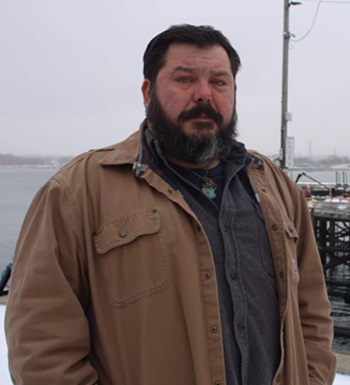 Since its founding three years ago, the New England Fishermen’s Stewardship Association has been a vocal opponent of offshore wind and relied on funding from a right-wing advocacy group connected to one of the most influential conservative activists in the U.S. Now, the fishermen’s organization known as NEFSA is looking to diversify its revenue sources by asking coastal communities in Maine for financial support. Jerry Leeman is the founder and CEO of NEFSA. And for the past three years he’s been the star of an advocacy campaign that’s led him up and down the northeast coast to preach against offshore wind. Leeman and NEFSA have been making some noise. more, >>CLICK TO READ<< 07:23
Since its founding three years ago, the New England Fishermen’s Stewardship Association has been a vocal opponent of offshore wind and relied on funding from a right-wing advocacy group connected to one of the most influential conservative activists in the U.S. Now, the fishermen’s organization known as NEFSA is looking to diversify its revenue sources by asking coastal communities in Maine for financial support. Jerry Leeman is the founder and CEO of NEFSA. And for the past three years he’s been the star of an advocacy campaign that’s led him up and down the northeast coast to preach against offshore wind. Leeman and NEFSA have been making some noise. more, >>CLICK TO READ<< 07:23
Hopes for Offshore Wind Are Blowing Away
 Welders are hard at work at the Paulsboro Marine Terminal, four years after New Jersey Gov. Phil Murphy announced a $250 million investment from offshore wind energy companies in a new manufacturing facility. But instead of putting together massive monopiles to prop up wind turbines off the Jersey Shore, they’re taking them apart to sell for scrap. In 2023, Ørsted, a Danish wind developer, announced it was pulling out of two planned wind projects that would have provided about 2,200 megawatts of energy to New Jersey. Earlier this year, Shell announced it was canceling a $1 billion investment in another offshore wind project in the state. A few days later, Murphy announced that his administration wouldn’t put any more state money into offshore wind. more, >>CLICK TO READ<< 10:28
Welders are hard at work at the Paulsboro Marine Terminal, four years after New Jersey Gov. Phil Murphy announced a $250 million investment from offshore wind energy companies in a new manufacturing facility. But instead of putting together massive monopiles to prop up wind turbines off the Jersey Shore, they’re taking them apart to sell for scrap. In 2023, Ørsted, a Danish wind developer, announced it was pulling out of two planned wind projects that would have provided about 2,200 megawatts of energy to New Jersey. Earlier this year, Shell announced it was canceling a $1 billion investment in another offshore wind project in the state. A few days later, Murphy announced that his administration wouldn’t put any more state money into offshore wind. more, >>CLICK TO READ<< 10:28
Athearn Marine Agency Boat of the Week: 50′ x 23′ 6″ Novi Lobster/Scalloper, 650HP CAT C18-ACERT Diesel
 To review specifications, information, with 56 photos, >click here<. To see all the boats in this series >click here<. 06:09
To review specifications, information, with 56 photos, >click here<. To see all the boats in this series >click here<. 06:09

All Sides Struggling to Find Common Ground for Potential Compensation Package
Compensation talks among the Maryland Department of Natural Resources, US Wind, Worcester County and commercial fishermen have reached a stalemate. As US Wind continues its efforts to buy two properties in the West Ocean City harbor, DNR is working on a deal for commercial fishermen who would be impacted. Those talks have been ongoing for nearly a year, and on Friday, March 28, DNR met with Worcester County officials and commercial fishermen, hoping to iron out the details before coming to a final agreement. Commercial fisherman Sonny Gwin was at Friday’s meeting. He said money and a new fish house are not the solution here. Video, more, >>CLICK TO READ<< 06:45
DOGE DISCOVERS SHOCKING EXPERIMENTS TO TURN MANATEE’S INTO MANASHE’S By Jane Lovgren
 In a shocking revelation today, Elon Musk announced that his Department of Government Efficiency had discovered an incredibly disturbing use of taxpayer money by the National Institute of Health to transform endangered Manatee’s into Manashe’s. The project has been ongoing since 2012, starting during the Obama administration, at the urging of “Big Mike”, a shadowy figure with close ties to the President. While DOGE is still wading through the complex funding mechanisms, they have documented over fifty million dollars spent on this experiment, the purpose of which was to save the Manatees from extinction by allowing them to impregnate themselves, thus eliminating the need for males altogether. more, >>CLICK TO READ<< 05:30
In a shocking revelation today, Elon Musk announced that his Department of Government Efficiency had discovered an incredibly disturbing use of taxpayer money by the National Institute of Health to transform endangered Manatee’s into Manashe’s. The project has been ongoing since 2012, starting during the Obama administration, at the urging of “Big Mike”, a shadowy figure with close ties to the President. While DOGE is still wading through the complex funding mechanisms, they have documented over fifty million dollars spent on this experiment, the purpose of which was to save the Manatees from extinction by allowing them to impregnate themselves, thus eliminating the need for males altogether. more, >>CLICK TO READ<< 05:30
Already hit by China, Nova Scotia’s seafood sector braces for U.S. tariffs next week
 Stewart Lamont, managing director of Tangier Lobster Company Ltd., on Nova Scotia’s eastern shore, said the lobster sector is “incredibly anxious” as it waits to see how prices are affected. Lamont’s company exports live lobster to 13 countries around the world. “People are nervous,” he said in an interview Friday. “We have received more calls than normal from dealers on whether we would be interested in buying lobster from them this spring.” Meanwhile, Osborne Burke, general manager of Cape Breton-based seafood processor Victoria Co-operative Fisheries Ltd., said the pending U.S. tariffs are particularly concerning to the crab fishery because of the heavy reliance on the market south of the border. more, >>CLICK TO READ<< 08:02
Stewart Lamont, managing director of Tangier Lobster Company Ltd., on Nova Scotia’s eastern shore, said the lobster sector is “incredibly anxious” as it waits to see how prices are affected. Lamont’s company exports live lobster to 13 countries around the world. “People are nervous,” he said in an interview Friday. “We have received more calls than normal from dealers on whether we would be interested in buying lobster from them this spring.” Meanwhile, Osborne Burke, general manager of Cape Breton-based seafood processor Victoria Co-operative Fisheries Ltd., said the pending U.S. tariffs are particularly concerning to the crab fishery because of the heavy reliance on the market south of the border. more, >>CLICK TO READ<< 08:02
Beach Town Poised to Use Green Left’s Favorite Legal Strategy Against Massive Offshore Wind Project
 The town of Nantucket, Massachusetts looks set to use one of the green left’s go-to legal strategies against a massive offshore wind farm supported by liberal environmentalists. Environmental groups have used “sue and settle” tactics — wherein plaintiffs sue an aligned administration to kill a disfavored project, which the aligned administration effectively does via settlement — for decades to impede infrastructure projects they oppose. Now, Nantucket is suing the Trump administration and alleging that key procedural laws were not followed in Biden-era approvals for the massive SouthCoast wind farm off the island’s coast, teeing up a potential “sue and settle” situation that could derail a major project supported by the green left. more, >>CLICK TO READ<< 06:44
The town of Nantucket, Massachusetts looks set to use one of the green left’s go-to legal strategies against a massive offshore wind farm supported by liberal environmentalists. Environmental groups have used “sue and settle” tactics — wherein plaintiffs sue an aligned administration to kill a disfavored project, which the aligned administration effectively does via settlement — for decades to impede infrastructure projects they oppose. Now, Nantucket is suing the Trump administration and alleging that key procedural laws were not followed in Biden-era approvals for the massive SouthCoast wind farm off the island’s coast, teeing up a potential “sue and settle” situation that could derail a major project supported by the green left. more, >>CLICK TO READ<< 06:44

Seafood operator applauds NOAA Fisheries cutbacks
One local seafood market owner is not sad to see the fisheries arm of the National Oceanic and Atmospheric Administration scaled back. NOAA Fisheries keeps track of fish stocks, determines when certain fish can be caught and sets catch limits. Last month, the Trump administration fired more than 160 fisheries employees. Those who rely on NOAA Fisheries say the cutbacks mean that stakeholders have lost a voice needed to manage coastal fisheries. But Gerald Pack, who owns Safe Harbor Seafood Market in Mayport, would be glad to see NOAA go. “If they laid NOAA off, it won’t bother the fishing industry,” Pack said. more, >>CLICK TO READ<< 07:55
RI Delegation Introduces Bill to Secure Fair Representation on Catch Quota Decisions
 Rhode Island’s congressional delegation is making a renewed push to give the state’s fishermen a voice in federal fishery management decisions. Senators Jack Reed and Sheldon Whitehouse, along with Representatives Seth Magaziner and Gabe Amo, have reintroduced the Rhode Island Fishermen’s Fairness Act (S.1152/H.R.2375). The bill would grant Rhode Island voting representation on the Mid-Atlantic Fishery Management Council (MAFMC), which oversees regulations for key commercial fish stocks—including squid, one of the Ocean State’s most valuable catches. more, >>CLICK TO READ<< 07:14
Rhode Island’s congressional delegation is making a renewed push to give the state’s fishermen a voice in federal fishery management decisions. Senators Jack Reed and Sheldon Whitehouse, along with Representatives Seth Magaziner and Gabe Amo, have reintroduced the Rhode Island Fishermen’s Fairness Act (S.1152/H.R.2375). The bill would grant Rhode Island voting representation on the Mid-Atlantic Fishery Management Council (MAFMC), which oversees regulations for key commercial fish stocks—including squid, one of the Ocean State’s most valuable catches. more, >>CLICK TO READ<< 07:14
NOAA Hired an Anti-Wind Activist as Its Top Lawyer
 The National Oceanic and Atmospheric Administration has hired a new general counsel who was, until recently, pursuing legal challenges to offshore wind farms on behalf of the fishing industry, Heatmap has learned. NOAA’s Fisheries division, also known as the National Marine Fisheries Service, regulates species protection within U.S. waters. Activists have sought to persuade the Trump administration to review the division’s previous and future approvals for offshore wind projects that interact with endangered marine life, which would be a huge win for the “wind kills whales” movement. Enter Anne “Annie” Hawkins, NOAA’s new general counsel, who comes to the agency after serving for years as the executive director of the Responsible Offshore Development Alliance, an organization founded in 2017 that has fought offshore wind projects on behalf of the fishing industry. Hawkins stepped down as RODA’s executive director last fall, shortly after Trump won the presidential election. Links, more, >>CLICK TO READ<< 15:22
The National Oceanic and Atmospheric Administration has hired a new general counsel who was, until recently, pursuing legal challenges to offshore wind farms on behalf of the fishing industry, Heatmap has learned. NOAA’s Fisheries division, also known as the National Marine Fisheries Service, regulates species protection within U.S. waters. Activists have sought to persuade the Trump administration to review the division’s previous and future approvals for offshore wind projects that interact with endangered marine life, which would be a huge win for the “wind kills whales” movement. Enter Anne “Annie” Hawkins, NOAA’s new general counsel, who comes to the agency after serving for years as the executive director of the Responsible Offshore Development Alliance, an organization founded in 2017 that has fought offshore wind projects on behalf of the fishing industry. Hawkins stepped down as RODA’s executive director last fall, shortly after Trump won the presidential election. Links, more, >>CLICK TO READ<< 15:22
Nantucket officials, group challenge 3 offshore wind projects
 On Thursday, the town sued the U.S. Department of the Interior and the Bureau of Ocean Energy Management, requesting that the government “set aside” its record of decision approving SouthCoast Wind. Nantucket wants the government to restart its environmental review — a process that took more than three years to complete and culminated in key permits allowing the project to move forward with construction. Meanwhile, the Nantucket-based ACK for Whales (formerly known as Nantucket Residents Against Turbines) is asking the U.S. Environmental Protection Agency to rescind permits it granted to Vineyard Wind and New England Wind to construct and operate their offshore wind farms. more, >>CLICK TO READ<< 06:37
On Thursday, the town sued the U.S. Department of the Interior and the Bureau of Ocean Energy Management, requesting that the government “set aside” its record of decision approving SouthCoast Wind. Nantucket wants the government to restart its environmental review — a process that took more than three years to complete and culminated in key permits allowing the project to move forward with construction. Meanwhile, the Nantucket-based ACK for Whales (formerly known as Nantucket Residents Against Turbines) is asking the U.S. Environmental Protection Agency to rescind permits it granted to Vineyard Wind and New England Wind to construct and operate their offshore wind farms. more, >>CLICK TO READ<< 06:37
Sea lamprey control program receives OK to rehire federal workers, after initial scare
 The Great Lakes’ Sea lamprey control program has the OK to rehire three dozen federal employees it needs to combat the eel-like, invasive fish species. That’s after staffing cuts and hiring freezes from the Trump administration last month threatened the work, which the Great Lakes Fishery Commission said would have led to more than $200 million in lost fishing potential. The Great Lakes Fishery Commission is a Canadian American commission which coordinates lamprey control across the Great Lakes region. Each year, the commission contracts workers with the U.S. Fish and Wildlife Service to set traps and apply lampricide in rivers, stopping lamprey before they enter the Great Lakes. more, >>CLICK TO READ<< 10:40
The Great Lakes’ Sea lamprey control program has the OK to rehire three dozen federal employees it needs to combat the eel-like, invasive fish species. That’s after staffing cuts and hiring freezes from the Trump administration last month threatened the work, which the Great Lakes Fishery Commission said would have led to more than $200 million in lost fishing potential. The Great Lakes Fishery Commission is a Canadian American commission which coordinates lamprey control across the Great Lakes region. Each year, the commission contracts workers with the U.S. Fish and Wildlife Service to set traps and apply lampricide in rivers, stopping lamprey before they enter the Great Lakes. more, >>CLICK TO READ<< 10:40
Atlantic lobster industry could be hurt by tariffs from China, U.S.
 Atlantic Canada’s $2.9-billion lobster industry could be impacted by tariffs imposed by the United States and China, an industry spokesperson said Tuesday. “At the moment we really don’t know how much impact there will be,” said Geoff Irvine, executive director of the Halifax-based Canadian Lobster Council. China imposed a 25 per cent tariff on Canadian seafood March 20, and U.S. President Donald Trump has threatened to begin tariffs on Canadian products on April 2. Tariffs on Atlantic Canada’s lucrative lobster fishery were among the topics of discussion at the Maritime Fishermen’s Union annual convention, held in Moncton Monday and Tuesday. Irvine said Atlantic Canada exports approximately $2.9 billion worth of lobster annually, with 67 per cent going to the United States and 20 per cent going to China. more, >>CLICK TO READ<< 08:34
Atlantic Canada’s $2.9-billion lobster industry could be impacted by tariffs imposed by the United States and China, an industry spokesperson said Tuesday. “At the moment we really don’t know how much impact there will be,” said Geoff Irvine, executive director of the Halifax-based Canadian Lobster Council. China imposed a 25 per cent tariff on Canadian seafood March 20, and U.S. President Donald Trump has threatened to begin tariffs on Canadian products on April 2. Tariffs on Atlantic Canada’s lucrative lobster fishery were among the topics of discussion at the Maritime Fishermen’s Union annual convention, held in Moncton Monday and Tuesday. Irvine said Atlantic Canada exports approximately $2.9 billion worth of lobster annually, with 67 per cent going to the United States and 20 per cent going to China. more, >>CLICK TO READ<< 08:34
Russia’s ongoing war on Alaska fishermen
 These are tough times for Alaska’s fishermen, and Russia is a primary cause. During his recent confirmation hearing, Commerce Secretary Howard Lutnick joked with Alaska Sen. Dan Sullivan about the need to counter “communist fish.” In reality, the future of our entire industry could hinge on whether Secretary Lutnick succeeds. For more than a decade, the Kremlin has been implementing policies that take direct aim at Alaska’s fishing sector. In 2014, Russia banned U.S. seafood imports, choking off a $60 million market for Alaska fishermen, with pink salmon roe hit especially hard. In direct response, ex-vessel prices for pink salmon declined from $0.42 per pound to $0.23 per pound in 2015. By Matt Alward. more, >>CLICK TO READ<< 07:18
These are tough times for Alaska’s fishermen, and Russia is a primary cause. During his recent confirmation hearing, Commerce Secretary Howard Lutnick joked with Alaska Sen. Dan Sullivan about the need to counter “communist fish.” In reality, the future of our entire industry could hinge on whether Secretary Lutnick succeeds. For more than a decade, the Kremlin has been implementing policies that take direct aim at Alaska’s fishing sector. In 2014, Russia banned U.S. seafood imports, choking off a $60 million market for Alaska fishermen, with pink salmon roe hit especially hard. In direct response, ex-vessel prices for pink salmon declined from $0.42 per pound to $0.23 per pound in 2015. By Matt Alward. more, >>CLICK TO READ<< 07:18
Athearn Marine Agency Boat of the Week: 42′ Novi Dragger/Scalloper, 871Detroit w/ Mass CAP Permit
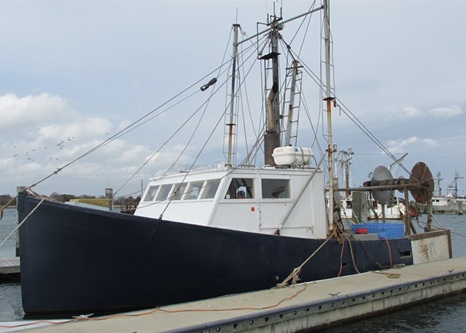 To review specifications, information, with 16 photos, >click here<. To see all the boats in this series >click here< 06:01
To review specifications, information, with 16 photos, >click here<. To see all the boats in this series >click here< 06:01







 It’s been four months since Henry Barnes, the mayor of this struggling fishing village in southern Alabama, wrote to Donald Trump for help. A flood of cheap imported shrimp is killing the local seafood market, he wrote, thanks to “low and non-existent tariffs.” He invited Trump, for whom he voted, to come visit Bayou La Batre, known as Alabama’s Seafood Capital. But thus far he hasn’t heard back. “He’ll eventually get around to us,” said Barnes, a third-generation net-maker. “I mean, we’re just a small town.” In February, Rep. Clay Higgins, R-La., sent a letter asking Trump to assist the state’s seafood industry by imposing tariffs of up to 100% on shrimp and crawfish imports. Photos,
It’s been four months since Henry Barnes, the mayor of this struggling fishing village in southern Alabama, wrote to Donald Trump for help. A flood of cheap imported shrimp is killing the local seafood market, he wrote, thanks to “low and non-existent tariffs.” He invited Trump, for whom he voted, to come visit Bayou La Batre, known as Alabama’s Seafood Capital. But thus far he hasn’t heard back. “He’ll eventually get around to us,” said Barnes, a third-generation net-maker. “I mean, we’re just a small town.” In February, Rep. Clay Higgins, R-La., sent a letter asking Trump to assist the state’s seafood industry by imposing tariffs of up to 100% on shrimp and crawfish imports. Photos, 



























